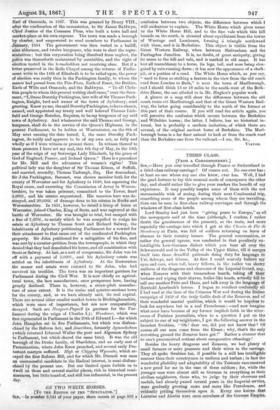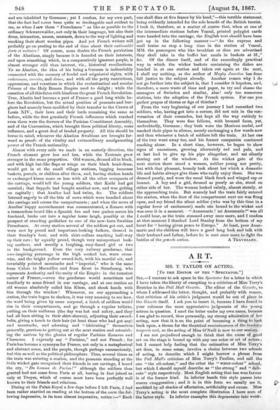THIRD CLASS.
[Film A. CORRESPONDENT.] SIR,—Have you ever travelled through France or Switzerland in a third-class railway-carriage? Of course not. No one ever has ; at least no one whom any one else knew, ever has. Well, I had the good fortune to try this unusual mode of conveyance the other day, and should rather like to give your readers the benefit of my experience. It may possibly inspire some of them with the not unreasonable wish of seeing, during their next Continental trip, something more of the people among whom they are travelling, than can be seen in first-class railway-carriages and through the windows of first-class hotels.
Lord Stanley had just been "giving peace to Europe," as all
the newspapers said at the time (although, I confess, I rather doubt the genuineness of the present), so the train, and more especially the carriage into which I got at the Chemin de Fer de Strasbourg at Paris, was full of soldiers returning on leave of absence to their country homes. The general conversation, or rather the general uproar, was conducted in that peculiarly un- intelligible Low-German dialect which you hear all over the Schwarzwald and in the Valley of the Upper Rhine, till it merges itself into those dreadful gutturals doing duty for language in Uri, Schwyz, and Glarus. At first I could scarcely believe my eyes and ears, when tall, heavy fellows, in the rather too showy uniform of the dragoons and chasseurs of the Imperial Guard, nay, when Zouaves with their tremendous beards, taking off their turbans and wiping their shaven, bullet-like heads, actually fell to call one another Fritz and Haus, and talk away in the language of Berthold A.jterbach's heroes. I began to recollect confusedly all I had read at the time of the Crimean War and during the Italian campaign of 1859 of the truly Gallic dash of the Zou.aves, and of their wonderful martial qualities, which it would be hopeless to look for anywhere but in a real Frenchman ; —and now imagine what must have become of my former implicit faith in the utter- ances of Parisian journalists, when to a question I put on the subject to one of mi. neighbours, I got the following answer in the broadest Swabian, " Oh! dear me, did you not know that? Of course all our men come from• the Elsass ; why, that's the only recruiting ground the Zouaves have got !" Rather a stunner that to one's preconceived notions about comparative ethnology !
Besides the heavy dragoons and Zouaves, we had plenty of small farmers or mere peasants and their wives in the carriage. They all spoke Swabian too, if possible in a still less intelligible manner than their countrymen in uniform and turban ; in fact the wonderful pliability and adaptability of the Teutonic race received a new proof for me in the case of these soldiers ; for, while the younger ones were almost still as German in everything as their civilian neighbours, those who, to judge by their chevrons and medals, had already passed several years in the Imperial service, were gradually growing more and more like Frenchmen, and evidently priding themselves upon it. Every one knows that Lorraine and Alsatia were once .members of the German Empire,
and are inhabited by Germans ; yet I confess, for my own part, that the fact had never been quite so irrefragable and evident to me, as when I saw these " Frenchmen " as like as possible to the ordinary Schwarzwalder, not only in their language, but also their dress, intonation, names, manners, down to the way of lighting and smoking their short wooden pipes. And yet French writers will probably go on prating to the end of time about their nationalite forte et unitaire ! Of course, none doubts the French patriotism of the Alsatians, simply because it is founded on their interests, and upon something which, in a comparatively ignorant people, is almost stronger still than interest, viz., historical recollections. To an Alsatian, the idea of his being a German is indissolubly connected with the memory of feudal and seigniorial rights, with redevances, corvies, and dimes, and with all the petty restrictions, oppressions, and vexations in which the ecclestiastical and secular Princes of the Holy Roman Empire used to delight ; while the cessation of all thisdates with himfrom the great French Revolution. True, Alsatia had become a part of France a good long while be- fore the Revolution, but the actual position of peasants and bur- ghers had scarcely been modified by their transfer to the Crown of Louis XIV., their laws and their lords remaining the same as before, while the first genuinely French influences which reached even them were the decrees of the Parisian Constituent Assembly, and of the Convention, which brought them political liberty, some influence, and a great deal of landed property. All this should be borne in mind, whenever the Alsatian Swabians are brought for- ward as proofs of the vitality and extraordinary amalgamating power of the French nationality.
Almost with every mile we made in an easterly direction, the French element grew less and less, while the Teutonic grew stronger in the same proportion. Old women, dressed all in black, and with high bat-like flaps or wings on their black head-dress, would get in at the small village stations, lugging immense baskets, parcels, or children after them, aud, having shaken hands or exchanged kisses more or less with all the other occupants of the carriage, would tell the young soldiers, that Kathi had got married ; that Seppele had bought another cow, and was getting on capitally ; that Annlies had had twins, &c. The soldiers listened eagerly to all the bits of news which were bandied about the carriage and across the compartments ; and when the news of Annlies' happy accouchement was communicated, a Zouave with a tremendous beard like a Spanish fan and two gashes across his forehead, broke out into a regular horse laugh, possibly at the prospect of standing godfather to one of the new- born Swabian Frenchmen. At every station several of the soldiers got out, and were met by proud and important-looking fathers, dressed in their Sunday's best, and with shirt-collars reaching half-way up their ears ; by equally proud, though very unimportant look- ing mothers, and usually a laughing, rosy-faced girl or two in the background. Even the very railway gendarme, that awe-inspiring personage in the high cocked hat, worn crow- wise, and the bright yellow sword-belt, with his martial air, and invariably pointed moustache and "imperial," who is the same from Calais to Marseilles and from Brest to Strasbourg, who represents Authority and the unity of the Empire in the remotest corner of France,—even the gendarme would sometimes nod familiarly to some friend in our carriage, and at one station an old woman absolutely called him Klaus, and shook hands with him through the window ! Whenever, on our approaching a station, the train began to slacken, it was very amusing to see how, the word being given by some corporal, a batch of soldiers would rise in their compartments, and go through a regular toilette, putting on their uniforms (the day was hot and sultry, and they had all been sitting in their shirt-sleeves), adjusting their sword- belts, giving a touch to their hair (at least those who had got any) and moustache, and adorning and " tittivating " themselves generally, previous to getting out at the next station and astonish- ing the natives by the glories of regular Parisian Zouaves and Chassenrs. I expressly say " Parisian," and not French ; for Paris has become a synonym for France, not only in a metaphorical and abstract sense, and the people, though perhaps unconsciously, feel this as well as the political philosophers. Thus, several times as the train was entering a station, and the peasants standing at the little wicket gate recognized their friends in our carriage, I heard the cry, "Da komma de Parisa!" although the soldiers thus greeted had not come from Paris at all, having in fact joined us only at Troyes, which of course must have been perfectly well known to their friends and relations.
Dining at the Palais Royal a few days before I left Paris, I had been rather startled on reading at the bottom of the carte the fol- lowing impressive, in its tone almost imperative, notice:—" Each one shall dine at five francs by his head,"—this terrible statement; being evidently intended for the sole benefit of the British tourist. I took it, therefore, as a matter of course that, when at one of the intermediate stations before Vesoul, printed polyglot cards were handed into the carriage, the English text should have been got up in the following manner :—" As the express and mail trains no stop a long time in the station of Vesoul, MM. the passengers who like breakfast or dine are advertised they shall take in the buffet bat meals in baskets at 3f.," &c. Of the dinner itself, and of the exceedingly practical way in which the wicker baskets containing the dishes are handed in at one station and taken out again at the next, I shall say nothing, as the author of Mugby Junction has done full justice to the subject already. Another reason why 1 do not go further into the subject is, that I consider it hopeless, and, therefore, a mere waste of time and paper, to try and shame the managers of Swindon and similar, alas! only too numerous stations, into the adoption of the French system. For can you gather grapes of thorns or figs of thistles ?
From the very beginning of our journey I had remarked two soldiers, who, having got into a corner, did not mix in the con- versation of their comrades, but kept all the way entirely to themselves. They were fine fellows, with bronzed faces, yet, undoubtedly, Germans ; they both wore the Mexican medal, and smoked their pipes in silence, merely exchanging a few words now and then whenever a bath of soldiers left the train. At last one of the two went away too, and his former companion continued smoking alone. In a short time, however, he began to show signs of uneasiness, growing alternately red and pale, and at last had to give up his pipe altogether, and sat silently staring out of the window. At the wicket gate of the next station there stood a woman, neither young nor pretty, but with that pleasant, homely look about her which a domestic life and habits always give those who really enjoy them. She was dressed poorly, and wore the usual black frock and winged cap or bonnet. A boy and a girl, dressed as poorly as she, stood on either side of her. The woman looked calmly, almost sternly, at the approaching train. But scarcely had the train fairly entered the station, when the door of the compartment next me was flung open, and my friend the silent soldier (who was by this time in a regular fever of excitement) made one bound to the wicket and was over it in a moment.. " Annemarie ! mi Annemarie!" was all I could hear, as the train steamed away once more, and I confess at that moment I thanked Lord Stanley from the bottom of my heart for " having given peace to Europe." At least, poor Anne- marie and the children will have a good loug look and talk with their husband aud father, before he is sent once more to fight the































 Previous page
Previous page